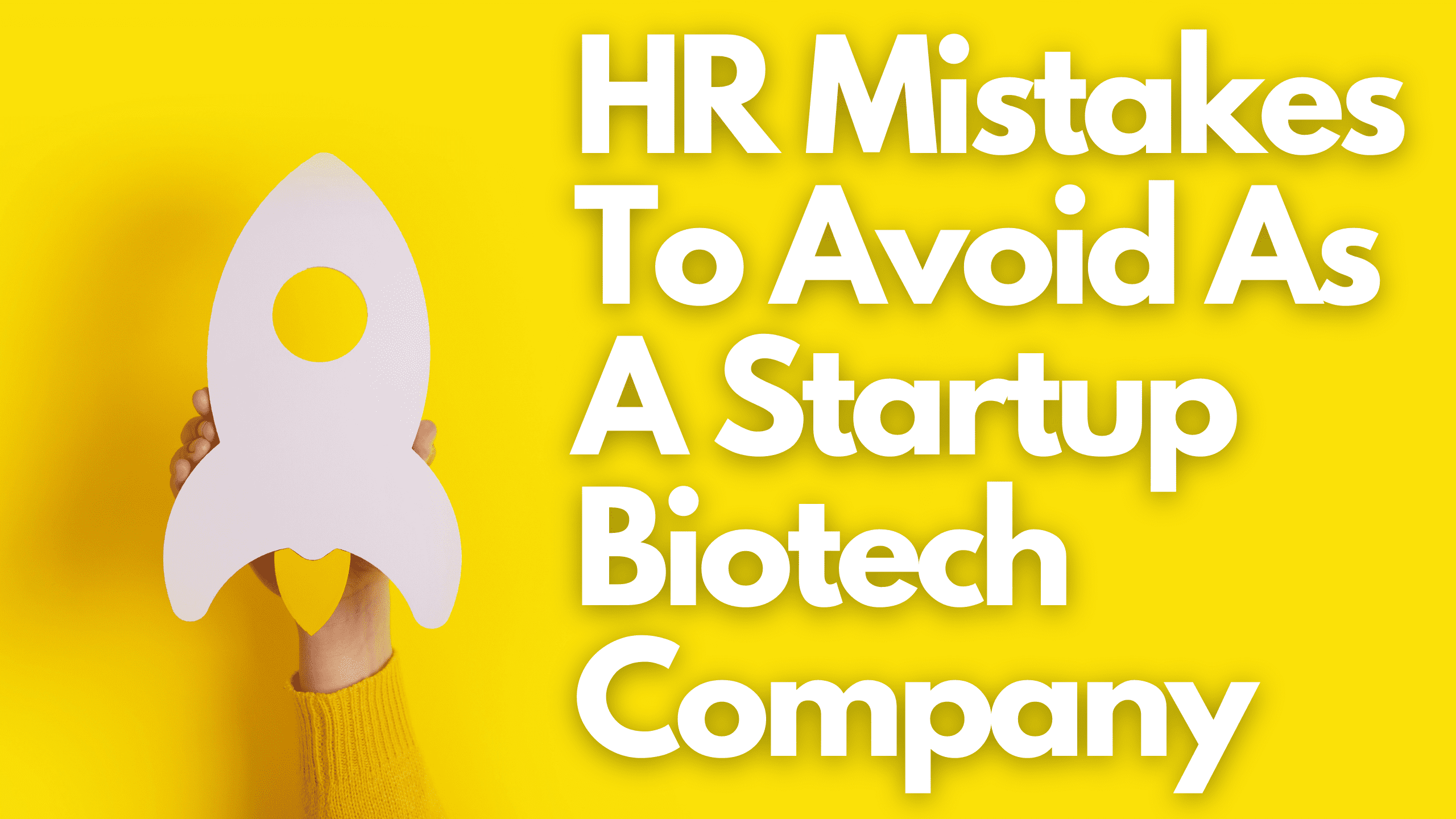
HR Mistakes To Avoid As A Startup Biotech Company
By Karen Haslbeck | October 17, 2023
| BioBuzz is thrilled to welcome guest posts and contributing writers to the “hive.” Enjoy the read from one of our expert contributors and be sure to get in touch if you have an idea or perspective you’d like to share. We’d love to buzz about it to see if it’s a fit! |
Employees at startups are often asked to do more with less. Generally, they sacrifice the resources they’d be offered at a mature business for the opportunity to be on the ground floor of growing one.
While it’s critical that leaders at startups run lean budgets, it’s equally important that they invest the appropriate time and energy in their people and the processes that support them.
In early-stage biotechnology companies, HR (Human Resources) plays a crucial role in building a strong foundation for growth and success. However, there are common HR mistakes that can occur in such companies. Here are a few examples:
Hiring Without a Strategy
You might have more work than you can handle, but before you hire a new team member, it’s important to decide what you need them to accomplish and how they’ll integrate with the rest of your team.
If you do hire without a plan (or if you wind up hiring the wrong people because you moved too fast), you may find yourself saddled with excess costs and a team that doesn’t function well together.
If you hire positions before you are ready for them (look six months ahead), it may result in the need for a layoff if things don’t go as planned.
Take time to assess your needs before making any hiring decisions. Look at the whole candidate, not just their skill set. This means considering the following:
- Commitment
- Record of being and ability to be a team player
- Short-term and long-term goals
- Cultural fit
- Experience in a startup environment
When you find a candidate you’d like to hire, clearly communicate what their new role will require. Don’t sugarcoat how your startup operates today – set realistic expectations to make sure your new hires know the company and the team they’re joining.
Inadequate Talent Acquisition
Hiring the right talent is critical for a biotech company’s success. One common mistake is not investing enough time and effort into the recruitment process. Rushing to fill positions without thoroughly evaluating candidates’ skills, experience, and cultural fit can lead to poor hiring decisions and the wrong people being onboarded.
On the flip side, don’t keep candidates hanging on without feedback about the status of their candidacy.
Lack of Structured Onboarding
Failing to provide a structured onboarding process can hinder new employees’ integration into the company and impact their productivity. Without proper guidance and training, new hires may struggle to understand their roles, goals, and the company’s culture, which can lead to dissatisfaction and turnover.
Put a defined process in place for how new hires will get trained and enculturated beyond their first day. This is especially critical for young employees, as it’s easy for them to get lost or feel left out.
A good onboarding process will help prevent churn by nurturing new hires and integrating them into the team. This is important because turnover not only costs money, it can also hurt your company’s culture and morale.
To avoid turnover, let new hires know from day one that they are part of an organized system that has a long view of the future. Set clear expectations from the beginning.
Pay & Title Escalation
Biotechnology companies often compete for top talent, and offering competitive compensation and attractive benefit packages is crucial. Failing to benchmark salaries against industry standards and neglecting to provide benefits that align with employees’ needs can make it challenging to attract and retain high-quality employees.
Another very common strategy to attract talent is to over-inflate both title and salary. This is not a good practice for several reasons:
- This will cause internal inequity between departments and positions.
- Titles without the necessary training and development is not fair to the employee who has a position they cannot handle.
- It will set the employee up for failure both internally and externally if they must find a new job.
Keeping Inexperienced Leaders
Scientists with expertise in their field often pioneer biotech companies. Their technical background makes them well-suited to work on developing the company’s technology or product. However, it might not make them the best fit for a role like CEO. Sometimes a founder lacks the business experience needed to fill that role effectively.
If you don’t have the experience and expertise needed to lead the company, part of your job as a founder or co-founder is to look for a capable CEO whom you can trust to execute the company vision. Identify what you need in a CEO and set up a way to vet candidates. Ask for nothing but 100% from them because anything less than that can lead to failure.
It’s wonderful to be able to offer your team the opportunity to take on leadership responsibilities, but it’s crucial to offer adequate training before asking new managers to step into this role. Here are three questions to ask when transitioning team members to management positions:
- Do they understand their new role and your expectations for their performance?
- Have you defined how their role changes from employee/producer to management?
- Are they able to recognize when an employee needs additional resources or support?
Many times, an employee is a great scientist and is promoted into a leadership role. This can set the great employee up for failure if they are not qualified to lead and the organization is not giving them support. Compared to other candidates on the market, is your person really the one you’d pick?
Poor Communication
Open communication and fostering employee engagement are vital for building a positive work environment. Failing to establish effective communication channels, including regular team meetings, feedback mechanisms, and transparent leadership, can lead to misalignment, decreased morale, and reduced productivity.
HR Compliance
With the myriad of state and federal regulations affecting small businesses, it is no wonder compliance is so complex and difficult for startups. Compliance issues can range from notices that need to be provided to employees at the time of hire, to which employees may be protected under federal anti-discrimination laws, to the types and amount of insurance coverage you should have.
For startups, it can be hard to comprehend much less manage all that needs to be done to stay in compliance. And the consequences of not being compliant, even if non-compliance is due to simple ignorance, can be disastrous to a small business. Significant fines and penalties can occur for FSLA, ADA, and OSHA violations, just to name a few. This could be the undoing of your startup if you’re not careful.
These are just a few HR mistakes that can occur in early-stage biotech companies. Recognizing and addressing these issues early on can help create a solid HR foundation to support the company’s growth and long-term success. Choose your team wisely, because the credentials and experience of the team are viewed as indicators of future success by your future investors.
- About the Author
- Latest Posts








